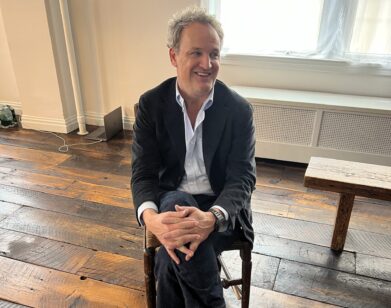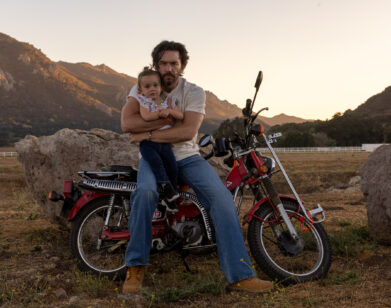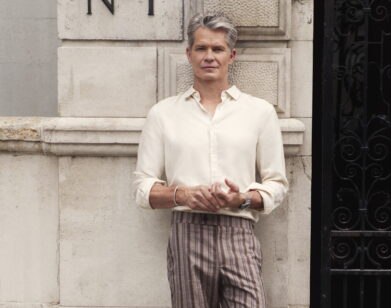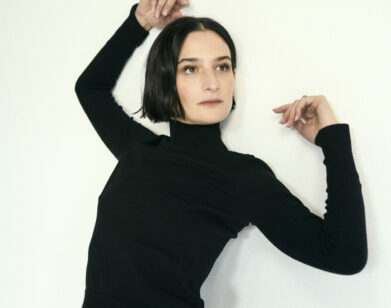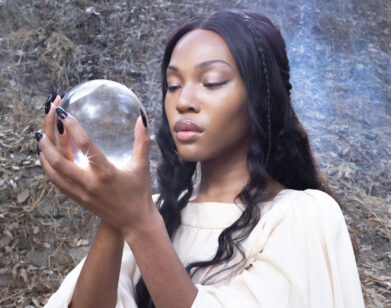Ramy Youssef and Abbi Jacobson Are Still Trying to Figure Out Life After Television
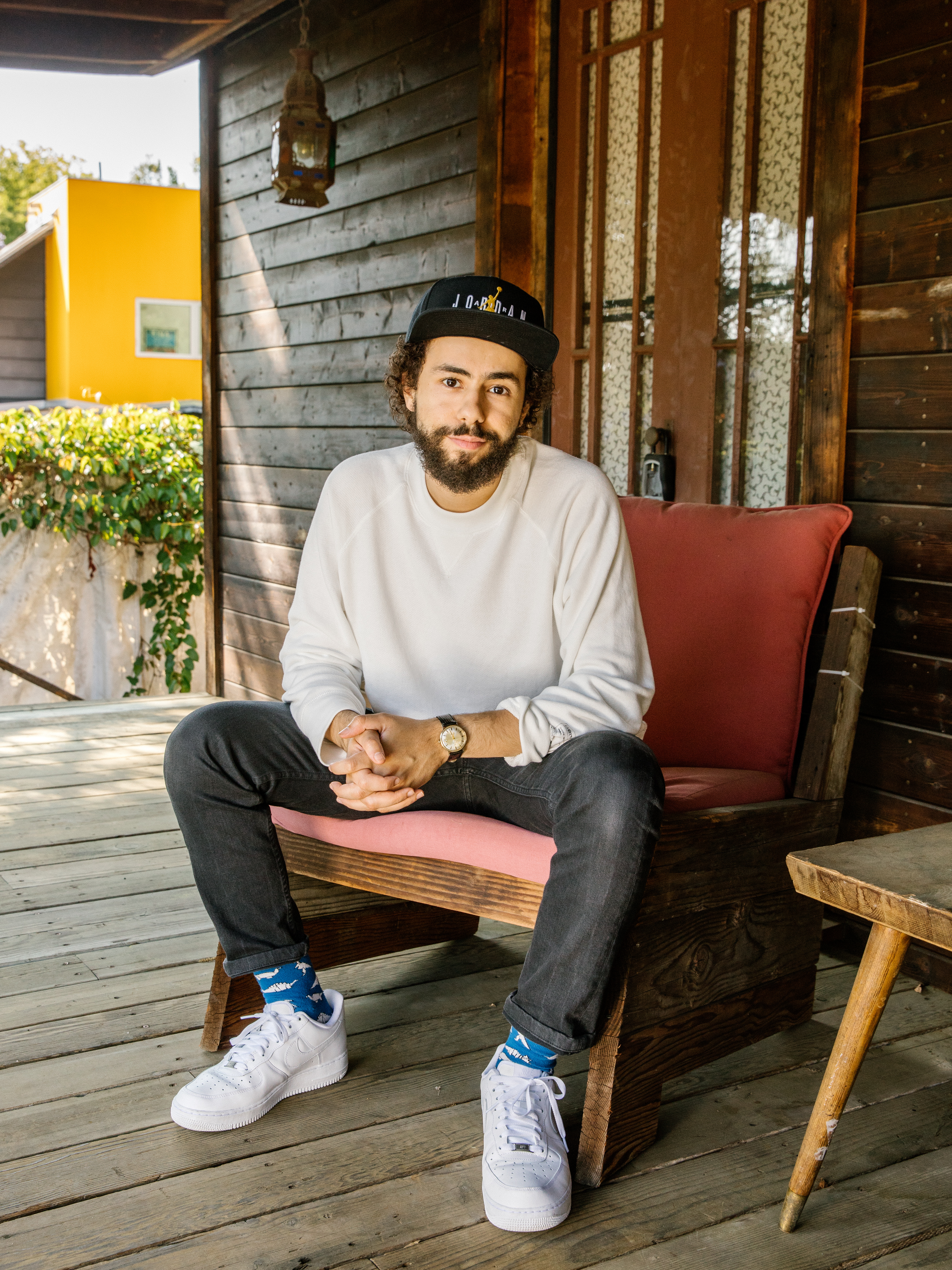
How do you talk about God on television? How do you talk about getting rebuked for washing your feet with your socks on because “Dirt in your toe is dirt on your heart?” How do you, as the first Muslim-American TV comedy, successfully communicate that experience for the streaming era, dating apps and start-ups and falafel outings and all? Ramy Youssef may not definitively know the answer to any of those questions, but he’s managed to do something with Ramy—the Hulu series he created and stars in, as the titular character—that strikes a chord in the sweet spot between universally resonant and hyper-specific.
Ramy is a rumination on what religion looks like not in the hands of priests and doting parents, but in the sex-addled brain of a Jersey City-based Muslim millennial who’s just trying to figure it all out. “It’s an alternate reality kind of version of me,” Youssef tells his friend and fellow comedian Abbi Jacobson, one-half of the duo behind Broad City, at his Los Angeles home. “I think of him as myself, but if I didn’t do stand-up. We decided that the only sci-fi element of this world is there is no stand-up comedy.”
Luckily for Ramy‘s burgeoning fandom, there is stand-up comedy in Youssef’s real world, and his new HBO special Feelings is equally as candid and current as the show. Youssef sat down with Jacobson to discuss the responsibility and perils of being a “first” on television, praying during production, and dating while TV-famous. — SARAH NECHAMKIN
———
ABBI JACOBSON: How do you feel about the fact that you have a hit TV show on TV with your name on it?
RAMY YOUSSEF: It’s on an app.
JACOBSON: But it’s still a TV show.
YOUSSEF: It’s so funny because you always want a TV show. And I’m like, it’s on an app.
JACOBSON: I watch a lot of TV on my TV. I don’t watch stuff on my phone.
YOUSSEF: It was really funny, I was at LAX and saw someone watching my show on their phone. They tweeted it, and it was so bizarre.
JACOBSON: That is so funny.
YOUSSEF: It’s a really weird feeling, watching someone watching it.
JACOBSON: And you said, “Hey. That’s—”
YOUSSEF: Well, they looked up and saw me. And I was like, “Oh.” Then she goes, “Oh.”
JACOBSON: That’s so good.
YOUSSEF: I was texting you about it.
JACOBSON: That’s why I was like, “How do I know this already?”
YOUSSEF: It’s weird because it’s my name. You know what that’s like.
JACOBSON: I do know. Except the show’s not called Abbi and Ilana. It’s kind of one step away.
YOUSSEF: But when people see you, they feel like they know you, right?
JACOBSON: Constantly. The character’s based on me, but it’s an amplified version of me. How do you differentiate or compare yourself to the character?
YOUSSEF: It’s an alternate reality kind of version of me. I think of him as myself, but if I didn’t do stand-up. In the show, not only does my character not do it, it actually doesn’t exist as a format. If someone had said, “stand-up comedy,” someone would go, “What are you talking about?”
JACOBSON: They don’t even want to touch it.
YOUSSEF: It doesn’t exist.
JACOBSON: If it existed, you would do it.
YOUSSEF: We decided that the only sci-fi element of this world is there is no stand-up comedy. Your character is you, with your thought process, with your philosophy, but you don’t have the answer in the same way. I think so much of real life is this avoidance of getting into the not knowing. So much of my life, I’ve been running from just admitting that I don’t know. So I try to find an answer. It’s interesting to be making a character where I don’t want him to know because, if he knew, there wouldn’t be enough story. In a weird way, it’s almost like he’s a pure me, a more realistic me. He’s me with fewer masks.
JACOBSON: I think it took a lot longer for me to get there because when we started, it was very much: Funny first. As we got more into it, the insecure feelings were brought to the forefront.
YOUSSEF: I think if you make a show where you try to make a character look good, not only is it kind of weird, but it’s sociopathic. It’s like, okay, I made a show called Ramy. Look at him being nice to baristas. He’s a big tipper and he winks.
JACOBSON: For the past eight or so years that you’ve been doing stand-up, it’s been career, career, career. And now you’ve put this thing out there and it exists. It’s immediate, since it’s on streaming. Now you’re able to have more hindsight.
YOUSSEF: I’m curious how you relate to that on a personal level. From the first season, people loved your show. You do the thing you set out to do, and it works on a level, and then you start realizing just how much of your personal life you’ve been delaying.
JACOBSON: You’re testing me now. Five seasons, and it’s over.
YOUSSEF: How does that feel? Do you feel stunted?
JACOBSON: I feel completely stunted. Your personal life goes away, but at the same time, people think they know you. I mean, Ilana [Glazer]’s married, and fully formed in that way. I think it has to be a choice to balance more. I’m bad at that. I turn myself into a workaholic. We’re catching you at a moment where you can make that choice.
YOUSSEF: Do you feel like you go out on a date and someone knows a lot about the show?
JACOBSON: Either that, or they don’t ask me anything about myself. I’m just asking questions about them, and they don’t ask me one thing about what I do or anything.
YOUSSEF: Because they know. They’re trying not to make it a thing. That’s too weird.
JACOBSON: You kind of just want someone to ask the right amount of questions.
YOUSSEF: You know, I met someone right around the time the show was coming out. I was like, oh, shit. Do I keep it alive? Or do I have to say, no, it’s got to stop because I need to dig into the work. Now I’m like, no. I have to put effort into that, too.
JACOBSON: You’ve got to try, for the both of us. You dive into faith on the show in a way that not a lot of shows do. Were you nervous about that?
YOUSSEF: Of course. I remember telling Jerrod [Carmichael, Executive Producer of Ramy], “Dude, I want to make something where God isn’t cheesy.” It’s not super clean because we didn’t want to offend anybody. It’s not angels in heaven. There’s the guilt-rattling. There’s the relationship between what you believe and what you actually do, and trying to find that space.
JACOBSON: I think you knocked it out of the park. I am Jewish and not very religious, but when I watched it, I was like, “Wow. That’s what I think about all the time.” It’s a constant struggle, and I don’t think it goes away.
YOUSSEF: Some of the billing of the show in the press—”average Muslim family”—was offensive to people. It’s a tough thing because no one would ever say “average Christian family.” Are you talking about Evangelicals? Are you talking about people in Texas? Are you talking about people in New York?
JACOBSON: How much money do they make? Are we talking about height?
YOUSSEF: Yeah, they’re all somewhere between 5′ 7″ and 6. The show focuses on my specific community, which is Arab Muslims. I think Arabs are like, “Yo, that’s us.” But most Muslims in America are black. The black Muslim community watches and they’re like, “We’re not in it.” South Asian Muslims are like, “What the fuck is this? This isn’t the way we are.” It’s almost like every Muslim desire has been put on this one show because there’s this scarcity, like we won’t get another one. I mean, literally, there are people on YouTube ranting about how I’m an atheist in disguise.
JACOBSON: What do your parents think?
YOUSSEF: I didn’t show my parents this show until a couple days before it came out. I really respect them, and I care about their opinion. It was almost like the most respectful thing I could do was not show it to them at first. They had some initial feelings, things they were uncomfortable with. I think there are things in the show that they will always be uncomfortable with, but they really are huge fans of the intention, and a lot of the execution. Most stories are told from the perspective of somebody attacking their faith and culture and trying to step away from it. And I think my parents respected that this was a story that’s actually trying to embrace it.
JACOBSON: I love the flashback episode. Ramy is such a pure-of-heart kid. That episode is so important.
YOUSSEF: It’s always been important to me to discuss that. [9/11] is something I always wanted to talk about, and I had never seen it from the perspective of a kid. It’s a very sensitive subject, and rightfully so. It’s one of the most traumatic things that we’ll ever see. There’s that scene of young me and Osama Bin Laden in my kitchen—I used to have this nightmare that Bin Laden was at our house. I was on set and crying, thinking like, this is what it looks like in my head. I mean, the guy we got looks like Bin Laden. That day on set was very scary.
JACOBSON: When you start out, you don’t realize the responsibility until you get going. I was thinking this is a platform that people watch for enjoyment purposes. But then you realize that it’s important to show these points of view that are not as visible as when the standard narrative is usually told.
YOUSSEF: It shouldn’t feel educational. I’m not really qualified to do that. The only thing I’m qualified to do is mess up the context. I was talking to my friend and he was like, “You know, people think they’re talking about pizza, and then you’re like, ‘Dude there isn’t even a crust. This isn’t pizza.'” That’s our job. Our job is to just be like, “Is there even a crust here? Is this even pizza? Is this even cheese?” We can’t get up there and be like, “Well, this is how to make a pizza.”
JACOBSON: When Broad City came out, people were like, “This is such a feminist show.” That was never really what we were going for. It just happened to be that—a sneak attack. That’s the sweet spot, if you happen upon it.
YOUSSEF: It’s feminist because you guys were being yourselves. There’s nothing more feminist than that.
JACOBSON: And it’s not like you sat down and were like, “There is not a show about an Arab Muslim man on TV yet. That point of view is not represented. I’m going to make that.” If you are struggling with faith, it goes into everything you do.
YOUSSEF: Being in this industry is so crazy that I don’t even know if I could be in it if I didn’t have faith. You have to have some level of it to want to keep doing this. Everyone who’s been in this long enough has some sort of practice. It doesn’t have to look like religion, but everyone’s got something because we need something in order to feel grounded.
JACOBSON: When you’re traveling, do you find a mosque?
YOUSSEF: Yeah, if I go somewhere, but the great thing is, you can pray anywhere. I’ve met a lot of people just by popping in a city and being like, “Where’s the mosque?” You would be surprised. You just type in “mosque” on Google Maps somewhere and, not only is there one, but there’s three, and you’re in Utah.
JACOBSON: And you do it five times a day?
YOUSSEF: Yeah, it’s short. A couple minutes.
JACOBSON: It feels like such a nice reason to slow down for a second. I wish I could do that. You go through fits of doing it and not doing it?
YOUSSEF: Yeah, of course. It’s a struggle. Some days, I only hit two. Some days I hit all five. The only regret I have from last season was that I didn’t do my five-a-day everyday, because I think it actually keeps me sharper and more focused. Even during production, we had them put prayer times on the policies and stuff.
JACOBSON: It’s so nice. It’s like an irrefutable, “No, we got to do this.”
YOUSSEF: We’re built to need a thing. I do think everyone has god. It’s just, who’s god for you? Is it god in the sky? Is it Shantel who teaches hot yoga Thursday mornings? Is it the person you’re in a relationship with? I hope not.
JACOBSON: That’s not good. You’ve got to put Shantel on season two.
YOUSSEF: Shantel broke my fucking heart.
———
Grooming: Sonia Lee for Exclusive Artists using Hanz De Fuko


